- Home
- M. L. Buchman
Wild Fire Page 3
Wild Fire Read online
Page 3
There were the two forward pilot seats with the broad console in front of them, which came partway back between the seats. Hard against the back of the pilot’s seat was the aft-facing seat of the woman who had helped him aboard. He sat up, facing sideways on the steel deck behind the copilot with his feet in the small stairwell for the door at the back of the cockpit. Leaning back against the sidewall, he looked straight across at the cute brunette in the observer seat.
She handed him a headset. He dragged it on and sighed with relief from the noise abatement. By looking up, he could see the pilot in profile.
“Well?” The pilot sounded just as pissed over the headset. Gordon took a moment to appreciate the sight. If the pilot had been pretty, seen straight on as he’d floated in the water and she’d been on the verge of cutting him in two, she was a stunner in profile.
“I’m a pilot type person,” he finally found his voice and managed to resist the need to cough out more lake water.
“Were you flying the goddamn drone?”
Gordon had to think about that for a moment. Either he was in shock, or the pilot’s looks were distracting him. She struck him as the sort of woman who would be very likely to distract him—badly. Maybe it was a combination of both.
“No,” he managed. “I’m the type of pilot who was hit by the goddamn drone.”
“Oh.”
“Oh?” Now it was his turn to be amused.
“You okay?”
“Well,” Gordon tried to figure that out but his mind wouldn’t quite connect to flexing and bending to check for injuries. “Someone said I was alive, so I guess so.”
“Janet, check him out.”
“He’s already checking you out,” Janet quipped.
Great! Exactly what Ripley didn’t need. She hit the transmit key as she climbed back aloft.
“ICA, as I was saying before, this is Erickson Aircrane Diana Prince. I’d like to report that we are heavy by one pilot.” She clicked off the mic switch. “What’s your name?”
There was a long pause before he said, “Diana Prince?”
She glanced back at him to see if he was shocky and needed immediate medical, knowing that Brad would continue her climb. But he was looking at her clear-eyed. Kneeling beside him, Janet shrugged—no obvious injuries.
“That’s my aircraft. Erickson Aircranes all have names,” she did her best to remain calm, but her nerves were still shaking after how close she’d come to killing him then downing her entire crew. He was average build, blond, and nice looking without being the overly handsome jerk-type she usually fell for.
“I get that,” he had a good voice too. “Just thinking about that maneuver you used to save my life. Haven’t met a whole lot of pilots who could do that. Pretty sure I couldn’t have. Wonder Woman isn’t just the name of your aircraft.”
He actually knew that Diana Prince was Wonder Woman’s secret identity name. Ripley had always liked flying with a secret identity of Wonder Woman. She tried not to be too pleased…and failed. Then she tried to not let it show, and expected that she failed at that as well. The guy had a great smile. She faced forward once more.
“Your name?”
“Gordon. Gordon Finchley.”
She keyed the mic again. “Diana Prince to ICA. You looking for a Gordon Gordon Finchley?”
She heard Gordon’s half laugh over the intercom. More proof that he wasn’t being shocky.
“You found him? What’s his status?”
“Well, he’d dripping water all over my cockpit, but otherwise appears to be intact.”
“Gordon,” the ICA’s voice sounded a little strained. “Don’t do that again.”
Ripley keyed the mic and nodded toward Gordon without turning.
“Didn’t know that crashing was against the rules, Mark. But I promise to never do it again now that you’ve told me. I swear, Mr. Henderson, sir.” She could practically hear Gordon saluting. “By the way, your helo, though there’s not much left of her after the drone and then battering her way through the trees, is in about thirty feet of water off the easternmost curve of the shore.”
“Glad you’re in one piece. Diana Prince, once you have water, I could use you on the west end of the line. Steve was able to track the hobby drone pilot with our legal drone and you were right, he was a solo idiot. Started yelling at the fireman who found him for destroying his drone and wanting someone to pay for it. Sheriff is taking care of that. Just wait until he gets the insurance company’s bill.” The ICA delivered it in two breaths, and if there was any emotion behind his pilot being alive, he managed to hide it well.
“You good?” Ripley called back to Gordon over the intercom.
“I’ve had my bath for the week, even got my clothes washed in the bargain. So, yeah, I’m good.”
“Roger,” she keyed the mic and called in, mimicking Gordon’s tone to hide her own laugh. “Diana Prince is on the way, Mr. Henderson, sir.”
And then the desire to laugh whooshed out of her as if it had never been.
Gordon had said the ICA was Mark…Henderson. She’d heard that Major Mark Henderson of the Night Stalkers had retired to fight fires and that his wife Major Emily Beale had gone with him. Could there be two Mark Hendersons?
“Hey, Gordon,” she called over the on-board intercom. “You have a pilot name of Emily in your outfit?”
“Emily Beale? Sure. Our chief pilot and trainer. Never seen anything like her. She’s about the only other one that could have pulled off that maneuver you did back there. I think she and Mark were in the military somewhere.” The sound of worship was clear in his voice.
That was one of the problems: everyone who talked about them spoke that way. Ripley didn’t generally doubt her own skills, but Henderson and Beale were spoken of as the top two helicopter pilots in the history of the US Army’s 160th SOAR. The Night Stalkers, as they called themselves, were the very best helo pilots in any Army. Or Navy. She’d considered trying to cross over, but they required a minimum of five years flying before applying and she’d been headed out of the military by then.
She glanced back and saw that Gordon had rested his head against the side wall and had closed his eyes. It was nice to see that his easy bravado had been just that. It would be far more worrisome if he had a true devil-may-care attitude. But at the moment, he looked exhausted and more than a little stressed. So, at least one of Henderson’s pilots wasn’t superhuman, which meant she had some slim chance of fitting in. She was impressed that he’d held it together at all through such a bad crash.
Ripley focused on lining up where Mark wanted her. She came in low from the west and ended up in a line behind three Firehawks. The fire had hit the leading edge of the firebreak that the smokies had slashed through the trees. Unable to move forward, the fire was piling up on itself, building a towering wall along the entire length of the clearing. It looked as if the wave of fire was about to break, falling forward to crash down upon the smokies from above.
The Firehawks slid into a nice neat line and laid down clouds of water in long, six-second spills. As soon as each bird finished its drop, it would peel away, up and east toward the water. Then the next one opened up. Military precision in a civilian outfit.
Aircranes tended to fly alone. A major fire could have an entire airshow going, and there’d be only one Aircrane.
Well, she was here to show them what one could do.
The three Firehawks had dumped three thousand gallons between them.
Ripley shifted another twenty feet upwind of their drop line to compensate for the increased fire intensity as she approached the middle of the line—bigger fires generated bigger winds, which shuffled the water drop sideways. Sixty knots speed and a hundred and fifty feet up. She flew along the fire’s leading edge, no more than a rotor width from the flame tops. There she unleashed her drop for a fifty-yard overlap with the last of the Firehawks and a setting for moderate coverage. She let it run. And run. And run.
Twenty-five hundred g
allons laid down on the fire in a long, clean line.
“Damn! But that’s a lot of water. That’s one of the sexiest things I’ve ever seen.”
It wasn’t Henderson, so it must be one of the pilots. No, it wasn’t over the radio, it was over the intercom. Gordon. He was twisted around and looking out the curved bubble of Janet’s aft controller position.
“Damn straight!” Ripley didn’t get to watch her own drops, except occasionally on video, but it was an amazing feeling to make such a difference with each pass of her helicopter.
As soon as she headed back toward the water, an MD 530 zipped up close to her port side. A moment later, it had climbed over her and come up to the starboard. The little helicopters had always made her twitchy. She was a Big Iron gal herself: Seahawks for the Navy and now the Aircrane—the first weighed ten tons fully loaded and her Aircrane could pick that up without breaking a sweat. An MD 530 weighed a ton and a half all in.
“Damn it! Why do they even have one of those? They aren’t good for much more than watering the plants.”
“Well,” Gordon said. “They occasionally do a fine job of clearing the skies of little drones.”
Crap! Be rude to the guy twice in two minutes. Usually she was smoother than that with members of the opposite sex. Maybe she was still shaky from almost cutting him in half. “Okay. Well, let me know if there are any other ways I can insult you.”
“Sure thing,” he agreed complacently. “Could you open a second radio on…” and he called out a frequency.
Pilot chatter came in loud and clear. She’d need to get the rest of the frequencies soon. Brad set it so that the ICA’s calls would automatically mute the pilot’s channel.
“Gordon?” A woman asked. “Are you really okay?” Her voice was soft and smooth with an Italian accent.
“I’m fine, Vanessa. Just wet, shook up, and damn glad to be alive.”
Between the Italian accent and sexy name, if she was beautiful, Ripley would hate her just on general principles.
“Oh, thank goodness.” Then, with a waggle of wings, the little MD 530 turned to go back to the fire.
Despite its simplicity, the brief exchange had been so intimate that it was almost embarrassing to listen to.
Ripley hadn’t been that intimate with anyone since, well, Chief Petty Officer Weasel Williams. Lieutenant Ripley Vaughan, a much younger and more naive version of herself, had left the Navy three years ago because she’d fallen in love with an enlisted man. An enlisted man who’d left her two days from the altar…for the wedding caterer. It was the last time she’d let herself be so trusting. Or trusting at all really.
But having someone to care about her the way Vanessa cared about Gordon would be…nice.
Ripley wished she wasn’t such a romantic.
It was all her parents’ fault, especially her Senegalese mother. There was no way that a girl who had been raised by a theater drama professor, who wrote romance novels on the side, could be anything but a romantic. Her mixed-race Oklahoman father had taken his one-eighth Cherokee heritage as a calling to become a cultural archaeologist for the local tribes—Ripley had inherited her straight dark hair from him. He too was always bringing home legends of true love, lasting from the time of the creation myths.
Ripley ran another drag of the sea snorkel alongside the burning lake shore—glad to see nobody floating out in the middle of the lake this time. The Firehawks had left her a clear path, settling in a line as they dunked their hoses and ran their pumps.
“Damn, that’s bloody awesome!” A female pilot on the helicopter frequency, but without any hint of an Italian accent. Australian this time. How many women were in this outfit? Usually, when Ripley showed up, it increased the total to one.
“How much water, how fast?” A man asked.
“Twenty-six hundred and fifty gallons. Forty seconds,” Ripley answered as she finished the run and pulled back aloft. Though even in the S-64F she could only carry over twenty-five hundred if she was at a low altitude and had burned most of her fuel, decreasing her total load. Didn’t mean that she had to tell anyone that.
“Mommy, I want one,” the Aussie called out. The Firehawks would still have fifteen more seconds to pump aboard their measly thousand gallons while she was already flying back to the fire.
Gordon just sat back and listened to the on-going firefight. It was strange to be sitting here with nothing to do as the flight volleyed back and forth between water and fire. They finally got a retardant tanker truck and a dip tank set up. The Firehawks switched over to dumping retardant by snorkeling their loads out of a “pumpkin,” which looked like a kiddie pool on steroids kept full of the red goo by the tanker.
The retardant was laid down in broad sweeps where the fire wasn’t—over the smokies’ slash pile, along the flanks, and finally the tail. Each swath coated an area of unburned trees and grass with a sticky red solution of phosphates and sulfates that made it so that no oxygen could reach the wood—no oxygen, no fire. The red let the pilots and ICA see where they’d already dropped.
The problem was that the fire had flared up so hot and fast that it constantly threatened to jump the narrow lines of defense. Twice the flank outran how fast they could lay down the retardant. Then it skipped over and started a fresh fire with new flanks and a new head. More retardant was laid down around that.
Vanessa stayed on water and hit spot fires.
That left the lake wide open for Ripley and her Aircrane to gather massive loads of water and hit the fire directly wherever the ground team needed it to be cooled down. The smokies’ line was now being tested by the main head, and the wildfire was definitely in no mood to stop.
Ripley battered away at it, slapping it down out of the crown in one section, only to have it flare up in the next. Several times she had to jump over to killing spot fires when Vanessa’s MD and Mickey’s 212 were overwhelmed by the number of embers falling and sparking downwind, closer to the community. The hundred homes at the southeast corner were nestled right into the trees. If the fire got loose, they didn’t stand a chance. When she flew over it, she could see the rural fire engines wetting down some of the closer houses while the police with their flashing lights were fighting the challenges of a reluctant evacuation.
The battle became a blur. Heat, noise, flame, and the intense chatter on the radios. Everyone wanted attention. Everyone wanted all the resources put to their section of the blaze.
Gordon could see the real advantage of a copilot. It wasn’t that they were needed to fly the aircraft. Even a monster aircraft like the Aircrane could probably be handled by a single pilot, but a copilot sure helped handle the radios.
“You take the Vs,” Ripley had called out to Brad. He muted her from the two VHF radios that were for talking to the ICA and the air-to-air comm for the helicopters. It let her focus on the FM radios in her coordination with the ground team. Much more rational than trying to pick your instructions out of four or five lines of simultaneous chatter.
They were definitely in it now. The battle was deeply engaged and everyone was doing something…except him.
He hadn’t merely watched a firefight since he’d been a kid growing up in Red Butte, Wyoming. A scrub fire had swept over the prairie and a helicopter had flown over to dump water on it before it overran the highway. He’d rushed out on his pony to watch. It had been a simple task for the UH-1 Huey, flying with a bucket on a longline, dipping water out of the lazy waters of the North Platte River…and he’d been hooked. Such a simple thing had shaped his whole life.
And now what was he supposed to do? No helo. MHA didn’t have a spare million-dollar aircraft sitting around. His own would be a complete write-off: shattered engine, bent frame, and all.
Yet he felt as if he was sitting once more on his pony watching the helicopter work up and down the distant fireline. His world had just changed…but he had no idea how. He could only hope it was for the better. Crashing once in a flying career was definitely once too many.
<
br /> Chapter Two
Ripley was fine as long as they were fighting the fire. The MHA crew quickly shifted their patterns for the Aircrane’s slower flying speed but massive capabilities. She could feel the Incident Commander-Air Henderson—safer to think of him that way rather than Major Mark Henderson—learning as well. Her Aircrane rapidly took the “heavy” role. Wherever the ICA needed the hardest punch, he sent in Ripley and her crew.
She liked that he called them by name. It was usually “Tanker 753, Coverage 4, 100 percent drop” and a set of grid coordinates. She’d expected a retired major to be an over-controlling military officer type. Instead Henderson used her first name from the very first call and simply gave her the coordinates. He let her choose the coverage and drop, assuming that she just might know the capabilities of a helo she’d been flying to fire for three years better than he did.
It also let her learn her fellow pilots’ names. Jeannie was the cheery Australian. Two guys, Vern and Mickey, had almost identical accents (the non-accent of the Pacific Northwest), though the former was nearly Oklahoma slow-spoken and the latter sounded like he was everyone’s best buddy. Mickey was also being teased about his recent marriage to Robin—yet another woman pilot—who had that flat, military tone down.
And there was Major Emily Beale (retired). Ripley didn’t hear her voice often as she was flying copilot to Vern, but whenever she did speak, the air went silent and everyone else listened. She didn’t talk about the fire itself; Emily was all about the flying. “Ten feet too close to the flames on that last run.” “Your drop is starting twenty feet earlier than you think it is.” No one asked how she knew what they were actually thinking, but neither did anyone refute it.
Soon enough, Ripley was the target of her guidance.
“What was your coverage setting on that last run?”
“Five,” Ripley replied carefully. She knew it had been a bit heavy, but better too heavy than too light.

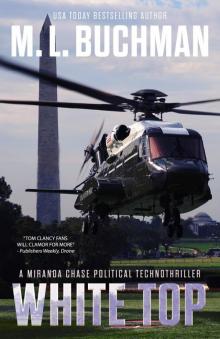 White Top
White Top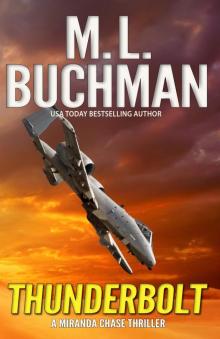 Thunderbolt
Thunderbolt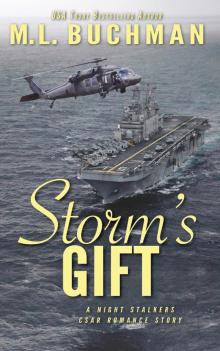 Storm's Gift
Storm's Gift The Complete Delta Force Shooters
The Complete Delta Force Shooters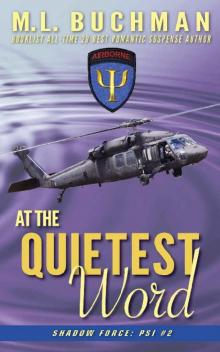 At the Quietest Word (Shadowforce: Psi Book 2)
At the Quietest Word (Shadowforce: Psi Book 2)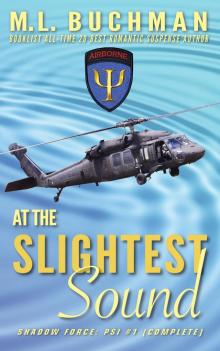 At the Slightest Sound
At the Slightest Sound Dilya's Christmas Challenge
Dilya's Christmas Challenge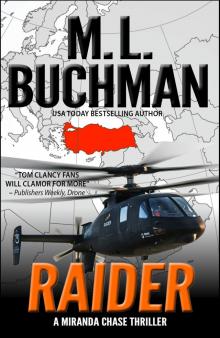 Raider
Raider Havoc
Havoc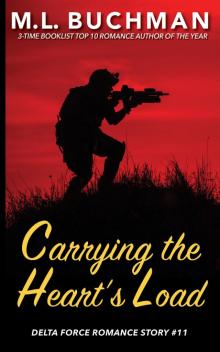 Carrying the Heart's Load
Carrying the Heart's Load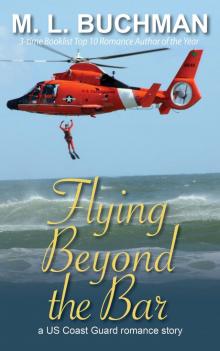 Flying Beyond the Bar
Flying Beyond the Bar Firelights of Christmas
Firelights of Christmas Where Dreams Are Well Done
Where Dreams Are Well Done Nathan's Big Sky
Nathan's Big Sky Heart of a Russian Bear Dog
Heart of a Russian Bear Dog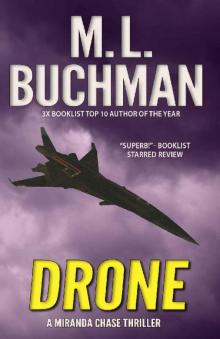 Drone: an NTSB / military technothriller (Miranda Chase Book 1)
Drone: an NTSB / military technothriller (Miranda Chase Book 1) Flower of Destiny
Flower of Destiny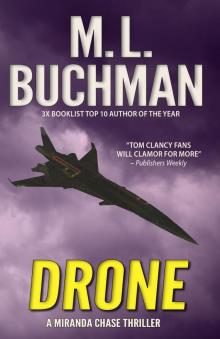 Drone
Drone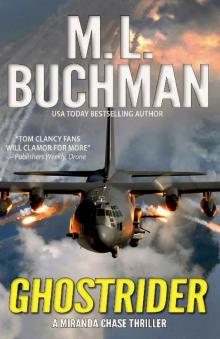 Ghostrider: an NTSB-military technothriller (Miranda Chase Book 4)
Ghostrider: an NTSB-military technothriller (Miranda Chase Book 4)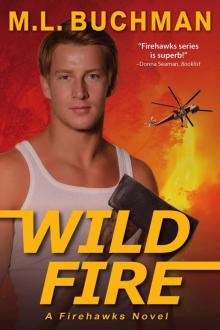 Wild Fire
Wild Fire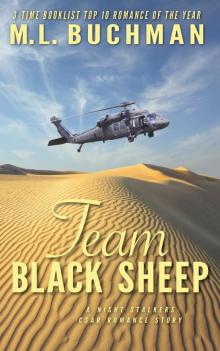 Team Black Sheep
Team Black Sheep The Complete Delta Force Warriors
The Complete Delta Force Warriors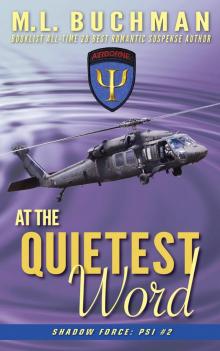 At the Quietest Word
At the Quietest Word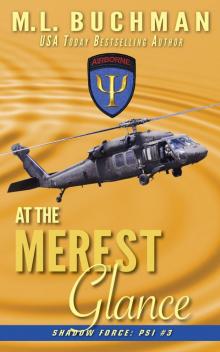 At the Merest Glance
At the Merest Glance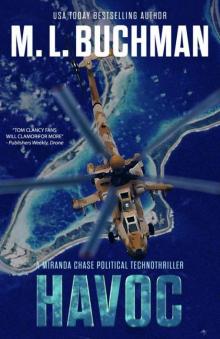 Havoc: a political technothriller (Miranda Chase Book 7)
Havoc: a political technothriller (Miranda Chase Book 7)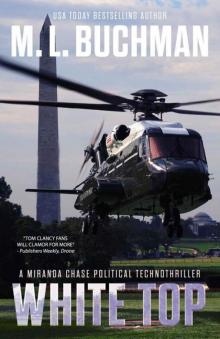 White Top: a political technothriller (Miranda Chase Book 8)
White Top: a political technothriller (Miranda Chase Book 8) Between Shadow and Soul
Between Shadow and Soul Island Christmas
Island Christmas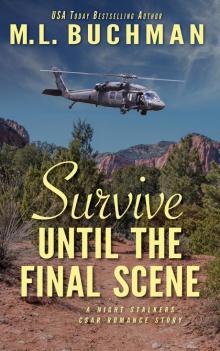 Survive Until the Final Scene
Survive Until the Final Scene Midnight Trust
Midnight Trust Return to Eagle Cove
Return to Eagle Cove Where Dreams Reside
Where Dreams Reside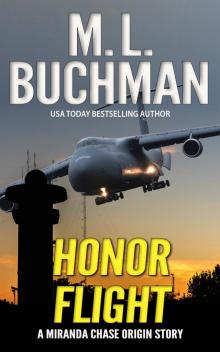 Honor Flight
Honor Flight Where Dreams Are Sewn
Where Dreams Are Sewn The Complete Hotshots
The Complete Hotshots Condor
Condor I Own the Dawn
I Own the Dawn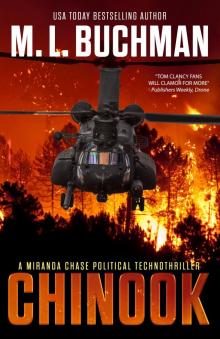 Chinook
Chinook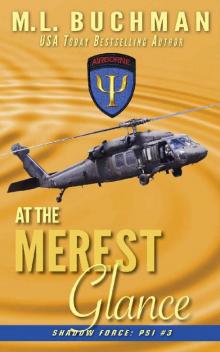 At the Merest Glance: a military paranormal romance (Shadowforce: Psi Book 3)
At the Merest Glance: a military paranormal romance (Shadowforce: Psi Book 3) Since the First Day
Since the First Day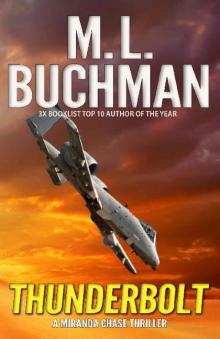 Thunderbolt: an NTSB / military technothriller (Miranda Chase Book 2)
Thunderbolt: an NTSB / military technothriller (Miranda Chase Book 2) For Her Dark Eyes Only
For Her Dark Eyes Only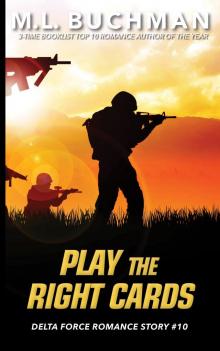 Play the Right Cards
Play the Right Cards Lost Love Found in Eagle Cove
Lost Love Found in Eagle Cove Big Sky Ever After: a Montana Romance Duet
Big Sky Ever After: a Montana Romance Duet Keepsake for Eagle Cove
Keepsake for Eagle Cove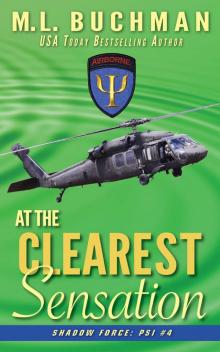 At the Clearest Sensation
At the Clearest Sensation The Ides of Matt 2015
The Ides of Matt 2015 When They Just Know
When They Just Know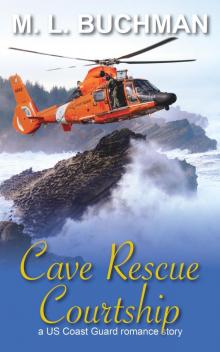 Cave Rescue Courtship
Cave Rescue Courtship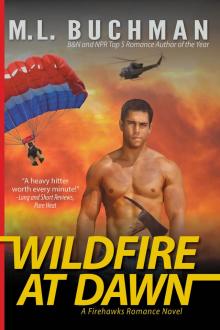 Wildfire at Dawn
Wildfire at Dawn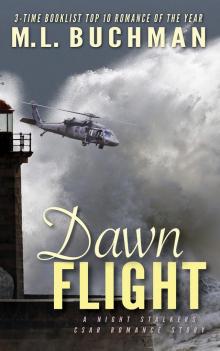 Dawn Flight
Dawn Flight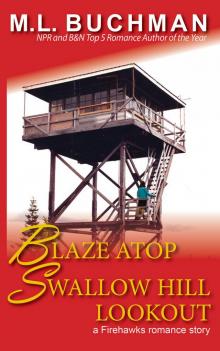 Blaze Atop Swallow Hill Lookout
Blaze Atop Swallow Hill Lookout The Sword of Io
The Sword of Io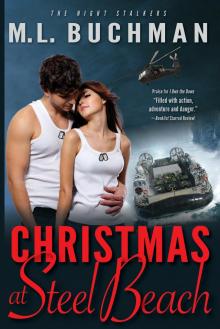 Christmas at Steel Beach
Christmas at Steel Beach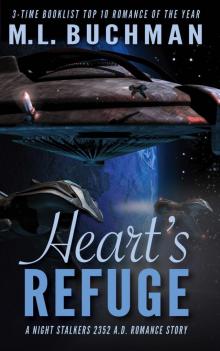 Heart's Refuge
Heart's Refuge By Break of Day (The Night Stalkers)
By Break of Day (The Night Stalkers)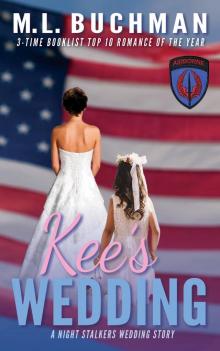 Kee's Wedding
Kee's Wedding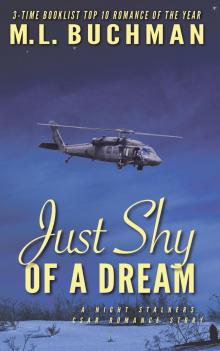 Just Shy of a Dream
Just Shy of a Dream Path of Love
Path of Love Ghost of Willow's Past
Ghost of Willow's Past Flash of Fire
Flash of Fire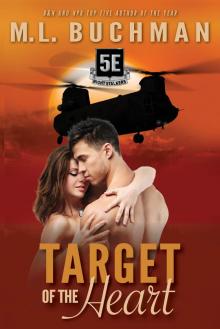 Target of the Heart
Target of the Heart Sound of Her Warrior Heart
Sound of Her Warrior Heart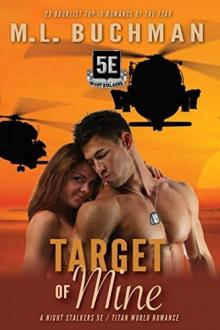 Target of Mine: The Night Stalkers 5E (Titan World Book 2)
Target of Mine: The Night Stalkers 5E (Titan World Book 2) The Complete Where Dreams
The Complete Where Dreams Target of One's Own
Target of One's Own For All Their Days
For All Their Days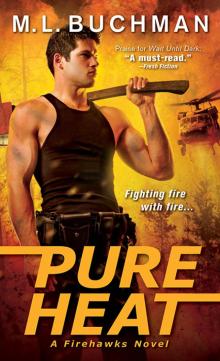 Pure Heat
Pure Heat Love's Second Chance
Love's Second Chance Target Engaged
Target Engaged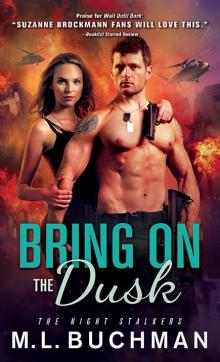 Bring On the Dusk
Bring On the Dusk Wait Until Dark (The Night Stalkers)
Wait Until Dark (The Night Stalkers) Big Sky, Loyal Heart
Big Sky, Loyal Heart Welcome at Henderson's Ranch
Welcome at Henderson's Ranch Damien's Christmas
Damien's Christmas Flight to Fight
Flight to Fight Nara
Nara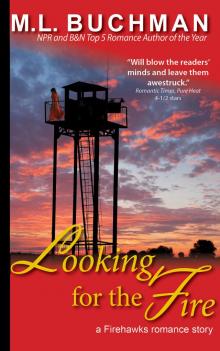 Looking for the Fire
Looking for the Fire Love Behind the Lines
Love Behind the Lines Peter's Christmas
Peter's Christmas In the Weeds
In the Weeds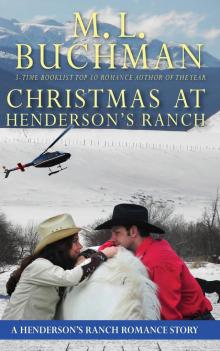 Christmas at Henderson's Ranch
Christmas at Henderson's Ranch They'd Most Certainly Be Flying
They'd Most Certainly Be Flying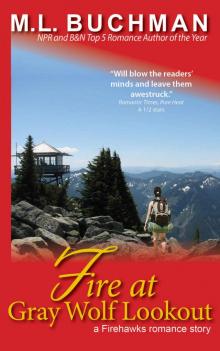 Fire at Gray Wolf Lookout (Firehawks Book 8)
Fire at Gray Wolf Lookout (Firehawks Book 8)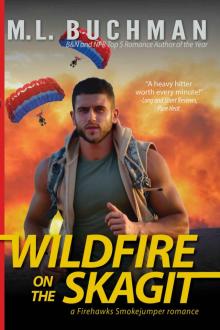 Wildfire on the Skagit (Firehawks Book 9)
Wildfire on the Skagit (Firehawks Book 9)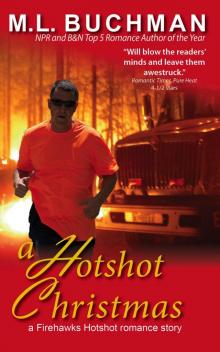 A Hotshot Christmas
A Hotshot Christmas Off the Leash
Off the Leash Where Dreams Books 1-3
Where Dreams Books 1-3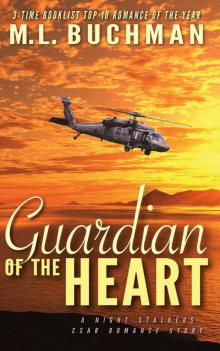 Guardian of the Heart
Guardian of the Heart The Ides of Matt 2017
The Ides of Matt 2017 Where Dreams Unfold
Where Dreams Unfold Twice the Heat
Twice the Heat Wild Justice (Delta Force Book 3)
Wild Justice (Delta Force Book 3) Flying Over the Waves
Flying Over the Waves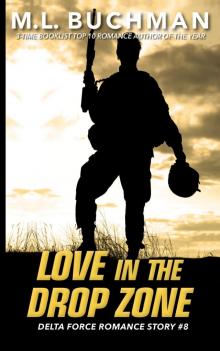 Love in the Drop Zone
Love in the Drop Zone I Own the Dawn: The Night Stalkers
I Own the Dawn: The Night Stalkers What the Heart Holds Safe (Delta Force Book 4)
What the Heart Holds Safe (Delta Force Book 4) The Christmas Lights Objective
The Christmas Lights Objective Road to the Fire's Heart
Road to the Fire's Heart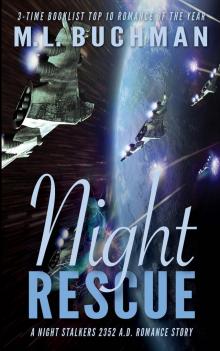 Night Rescue
Night Rescue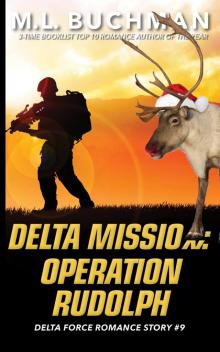 Delta Mission: Operation Rudolph
Delta Mission: Operation Rudolph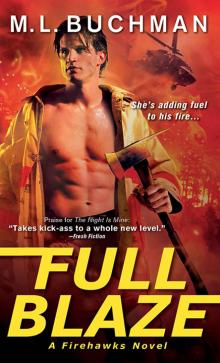 Full Blaze
Full Blaze Night Is Mine
Night Is Mine Lightning Strike to the Heart
Lightning Strike to the Heart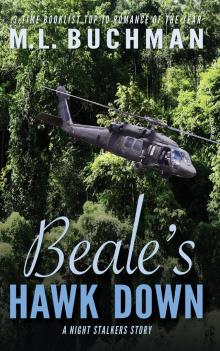 Beale's Hawk Down
Beale's Hawk Down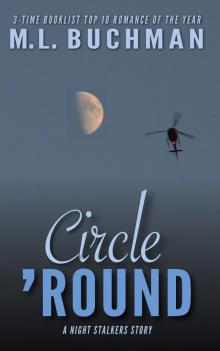 Circle 'Round
Circle 'Round Cookbook from Hell Reheated
Cookbook from Hell Reheated Zachary's Christmas
Zachary's Christmas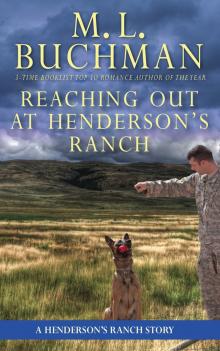 Reaching Out at Henderson's Ranch
Reaching Out at Henderson's Ranch Fire Light Fire Bright
Fire Light Fire Bright The Ides of Matt 2016
The Ides of Matt 2016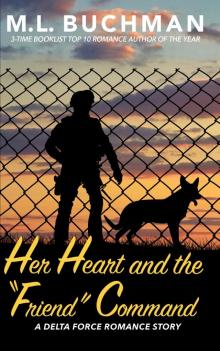 Her Heart and the Friend Command
Her Heart and the Friend Command On Your Mark
On Your Mark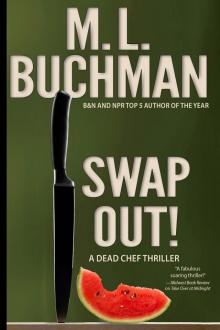 Swap Out!
Swap Out! Heart of the Cotswolds: England
Heart of the Cotswolds: England The Phoenix Agency_The Sum Is Greater
The Phoenix Agency_The Sum Is Greater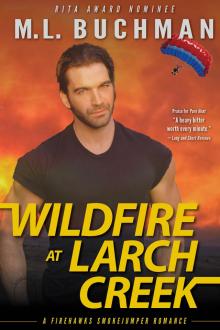 Wildfire at Larch Creek
Wildfire at Larch Creek Target Lock On Love
Target Lock On Love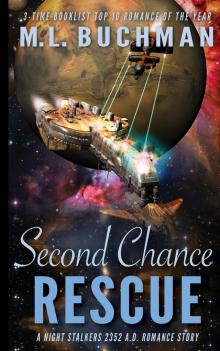 Second Chance Rescue
Second Chance Rescue Where Dreams Are Written
Where Dreams Are Written First Day, Every Day
First Day, Every Day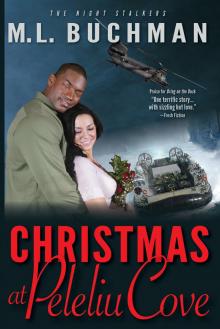 Christmas at Peleliu Cove
Christmas at Peleliu Cove Heart Strike
Heart Strike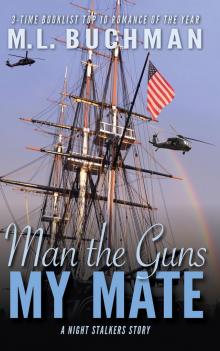 Man the Guns, My Mate
Man the Guns, My Mate Emily's Wedding
Emily's Wedding Daniel's Christmas
Daniel's Christmas Frank's Independence Day
Frank's Independence Day The Phoenix Agency: The Sum Is Greater (Kindle Worlds Novella)
The Phoenix Agency: The Sum Is Greater (Kindle Worlds Novella) Roy's Independence Day
Roy's Independence Day